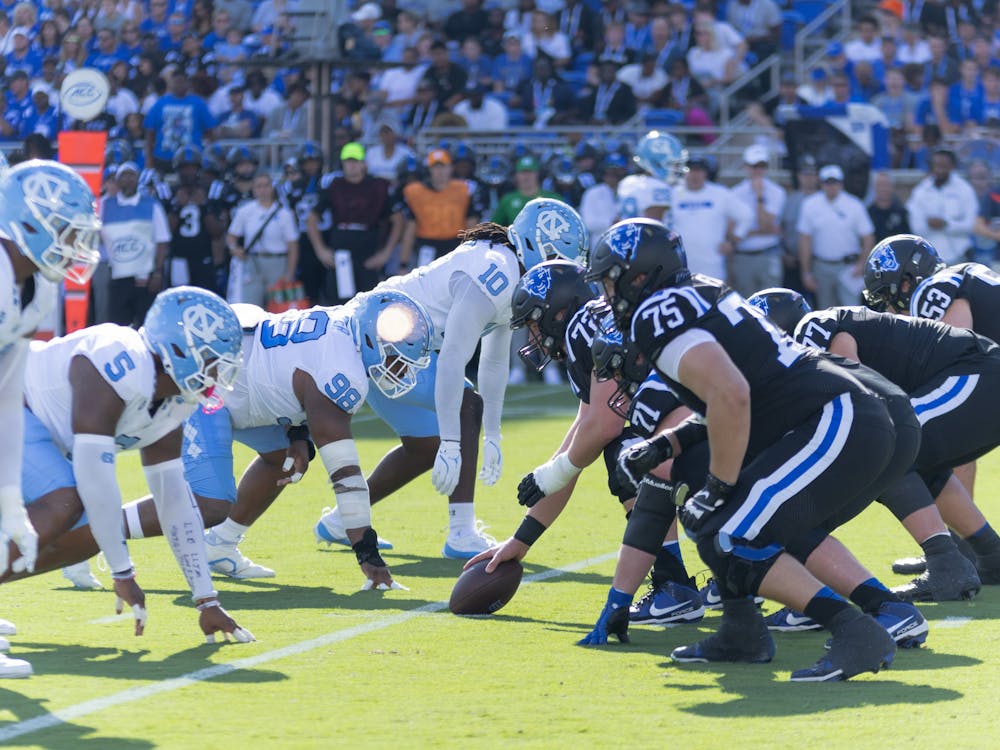Before this season started, head coach Manny Diaz was asked what fans should expect from his team’s identity.
“A team that never knows it's beaten and is very resilient,” he said. “Because football is a game of adversity, similar to how life is.”
Diaz emphasized mental toughness, because while football is certainly a physical game, that aspect often goes unnoticed. And in Duke’s 21-20 comeback victory against North Carolina, it was the Blue Devils’ steady mental state that guided them to the win.
“We will plan for all this time … very little will go according to plan, it's what always happens,” Diaz said prior to Week 1. “You are in the present moment, and there's always a problem to solve. You work the math, you solve the problem and you move on to the next thing.”
Pretty much nothing went right for Duke in the first half. But despite a 17-point deficit — which blossomed to 20 in the third quarter — there were no signs of quit from the Blue Devils. When the offense was stagnant and the defense worn out, the players continued to encourage each other and engage with the fans.
That energy was reciprocated by the coach in all four quarters of the game, not just when things were going well. Diaz continuously hyped up his players for the little things, running down the sideline to congratulate V.J. Anthony on a sack, Chandler Rivers for a pass breakup and Que’Sean Brown on a solid punt return.
“Even at halftime, there was no throwing helmets or no loud voices,” Diaz said. “We made a reference to just keep hitting singles, because what happens is you try to get it all back at once.”
Duke’s defense came out of the locker room strong; it forced a punt attempt and blocked it. But in what looked to be an early deflating blow for Diaz’s team, North Carolina regained possession of that blocked punt because the Blue Devils could not recover the ball after it crossed the line of scrimmage. The Tar Heels drove down the field, but were forced to settle for a field goal after running back Omarion Hampton could not move the chains on two short rushing attempts.
There was the first single, an important mini-win.
After that, it was all Duke. But it didn’t come all at once. The defense forced four straight punts, and the offense methodically drove down the field for multiple touchdown drives, buoyed by graduate running back Star Thomas and a strong offensive line.
“When we got to the fourth quarter, that's where we felt like we could dominate, and it just looked like we got stronger as the game went on and it looked like they went the other direction,” Diaz said. “That's our quarter, and that gives us a chance to win.”
Fourth-quarter comebacks are a theme for Duke’s entire season. Against Northwestern, the Blue Devils were down three in the fourth quarter and missed a field goal with just minutes remaining. The next week, UConn punched a typically stingy Blue Devil defense in the mouth with two third-quarter touchdowns. But Duke’s record is still unblemished, a product of outscoring teams 53-13 in the fourth quarter and overtime this season.
“We have another battle cry that we can catch you but you can't catch us,” Diaz said.
A fair point of criticism is that the first few games should not have been as close. But it misses the key point. This team does not panic in any game situation, against any team, at any time. That’s because of its faith in the coaching staff’s adjustments, and most importantly, each other.
“We put ourselves through the sewer for moments just like this, and so we know teams can't compete with us when we drive them through the sewer,” Anthony said after the North Carolina win.
At first glance, that seems like a strange metaphor. Why would a team want to be in a sewer? For Duke, it’s an opportunity to embrace the uncomfortable, a perfect example of the team’s mental framing of adversity. A sewer represents the rigor of the fourth quarter, and strength and conditioning coach David Feeley’s offseason workouts gave his squad the upper hand.
“[Feeley] trained us for moments like that … he teaches us to be stronger mentally and physically in the second half,” Thomas said. “The sewer smells so bad, you are the only ones that can sit in there and take it.”
Duke won’t be the best team on paper going into every game in the ACC slate, but that really doesn’t matter. Hampton was arguably the best player on the field coming into the game, and he made his presence felt in the first half with 71 yards and multiple receptions.
In his halftime speech, Diaz challenged both the offensive and defensive lines to change the game in the second half. The Blue Devils turned the tide in the trenches, and virtually shut down Hampton, a product of teamwork and relentlessness. Besides one breakout run, he was a nonfactor. Duke’s front seven — which led the country in tackles for loss — constantly swarmed the backfield, and wreaked havoc for quarterback Jacolby Criswell.
“We know we can't match up with every team talent wise, we just gotta stay in and stay focused and keep going hard,” Thomas said. “Our goal is to out work every team.”
Get The Chronicle straight to your inbox
Sign up for our weekly newsletter. Cancel at any time.
There are things to improve, namely the 3-and-outs early and the first-half defensive execution. Those might be exposed in later games this season.
But in their first five games, the Blue Devils showed they are never out of any contest. Duke has mastered perhaps the most important superpower in athletics — the power of the mind.

Ranjan Jindal is a Trinity junior and sports editor of The Chronicle's 120th volume.

